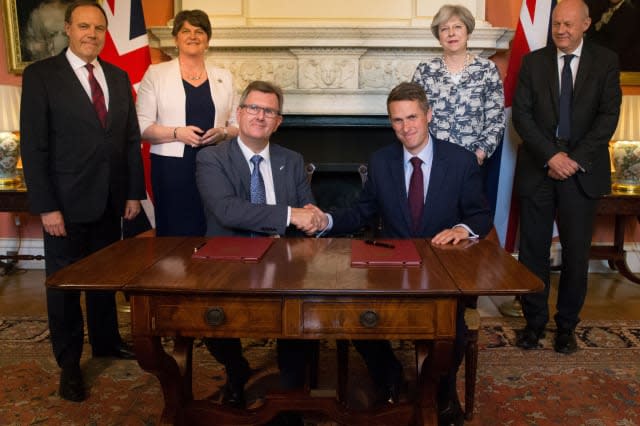Conservative and DUP deal: big news for pensioners

The Conservatives and the Democratic Unionist Party have finally hammered out a deal for the DUP to support the minority Conservative government, and some of the headlines will make welcome reading for pensioners. The pension triple lock is guaranteed until 2022, and means testing of the Winter Fuel payment is also off the table.
See also: Millions 'lurching like zombies' towards retirement
See also: Queen's Speech: what it means for your money
The good news
The Conservatives had wanted to switch the triple lock (where state pensions either rise in line with inflation, wages or 2.5% (whichever is higher)) for a double lock (without the 2.5% guarantee). However, the DUP wanted a commitment to the triple lock, and they have won the agreement as part of their deal.
Likewise the DUP didn't support the Conservative proposal to means test winter fuel payments, and this has been shelved as part of the agreement too.
Tom McPhail, head of policy at Hargreaves Lansdown points out that this doesn't come as a huge surprise, given the DUP's position on these policies. He adds: "The Conservatives' assumption they could win the election comfortably whilst withdrawing policy support from their core constituency of older voters back-fired painfully. The DUP position of retaining the Triple Lock and the winter fuel payment allows the Conservatives a welcome way out of this bind in the short-term."
Steven Cameron, Pensions Director at Aegon, said the news would "be welcomed by those who feared replacing it with a double-lock without the 2.5% underpin would mean pensioners lost out". However, he adds: "In practice, if as many expect inflation remains above 2.5% in the coming years, it will actually may make no difference whatsoever."
This news comes on the back of a change in the Queen's Speech last week, which didn't repeat Conservative party manifesto commitment on social care - including means testing care in people's homes and that people should pay for their own care until their assets are eroded to their last £100,000. Instead it promised a consultation.
Not too good
Cameron points out that this doesn't secure the triple lock for good. He says: "The bigger question is for how long future Governments can keep it in place, particularly if inflation returns to below 2.5%. With increased focus on intergenerational fairness, constantly prioritising retirees over those of working age could become increasingly politically difficult."
Pensioners shouldn't get too comfortable with the status quo in general. This is not a solid coalition, but a 'confidence and supply' arrangement. This may be less secure than a coalition, which means there's no guarantee that it will hold. Before terribly long, we could end up with another election, where all the cards are back on the table.
McPhail points out that the Conservatives have been clear that their manifesto promises remain part of their long term plan. He says: "It is telling David Gauke, now Secretary of State for Work and Pensions and former Treasury Minister has already gone on record since the election, reiterating Conservative sentiment that the Triple Lock should be abandoned."
Meanwhile, in order to secure DUP support, the Conservatives have agreed to a £1.5 billion spending package for Northern Ireland - including £1 billion of new money, and flexibility over how £500 million that has been committed to the region is spent.
The TaxPayers' Alliance is unimpressed with the promises made. Alex Wild, Research Director, says: "Taxpayers resent politicians cooking up deals behind closed doors that invariably end with their cash being thrown wherever is politically advantageous rather than where it could be best spent. The unfair way in which money is allocated between the Home Nations has been clear for decades, best illustrated by the significantly higher levels of public spending in Scotland than in considerably poorer parts of England. But until there is a major decentralisation of tax raising powers, Westminster politicians will always have ultimate control of the purse strings and be able to dish out taxpayers' cash in a way that benefits them more than the general public."




